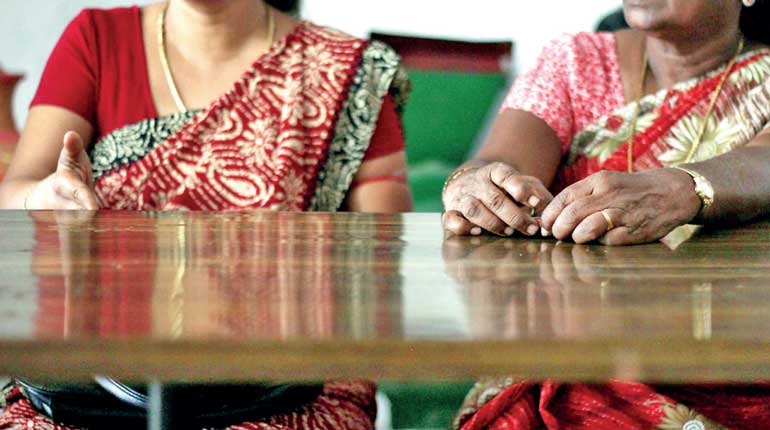Saturday Feb 14, 2026
Saturday Feb 14, 2026
Thursday, 10 December 2015 00:00 - - {{hitsCtrl.values.hits}}
 Women’s forum members in Batticaloa speak on their experiences with microfinance – Pic by Munira Mutaher
Women’s forum members in Batticaloa speak on their experiences with microfinance – Pic by Munira Mutaher
By ShiranIllanperuma
Women in Batticaloa say that when a knock resounds on their doors, they hide, sending their children instead to answer. If the knocker is a debt collector, the children are taught to say: “Amma vitiley illei” – “Mother is not home”.
In this region, where women traditionally control household finances, confrontations with debt collectors can be lethal. Such was the case when Maya, a married woman and mother of three, took out a loan that she could not pay back. A public admonishment from a debt collector left Maya humiliated and distraught. She committed suicide.
“This issue has been ongoing since the end of the war. Loan institutes have set up everywhere to take advantage of poor women. We try to educate the local women but the problem only seems be getting worse as time goes by,” says Shruthi, an organiser of a local women’s forum.
Shruthi explains that women often take up loans with the intention of starting their own entrepreneurial endeavours. However, this capital can end up being spent on immediate living expenses. Even if a small scale enterprise is kick-started, interest can stack up long before profits flow in.
A representative from NGO Caritas EHED Batticaloa chalks this up to financial illiteracy and irresponsible lending. “Women will usually want to start up a shop or small-scale farming. But lenders should check to see how viable this is, and if the business can keep up with interest rates,” he said.
Indeed, while minimum interest rates from ‘prime customers’ (those of a wealthier background who can pay back) can be as low as 10%, the going rates for microfinance and other lending institutions operating here can go beyond 20-30% said Caritas representatives.
However, Chief Economist of the Ceylon Chamber of Commerce Anushka Wijesinha cautions that not all lending institutions should be painted with the same brush. “The reality is that these financial institutions cater to people who are considered unbankable, so you cannot expect them to provide the same interest rates as banks,” he said.
That said, Wijesinha also argues that any Government regulation that steps in at this point could be a good thing. “It is true that some lenders have very aggressive practices, and regulation can help. But still, it is incumbent on financial institutions to be more responsible lenders.”
Women organisers like Shruthi claim that smaller microfinance institutions have been known to attend the women’s forums she leads around the area to poach vulnerable women. Enticed by the idea of quick capital, she alleges thatwomen are duped into signing English documents with no knowledge of interest rates.
Further, the Caritas EHED representative said: “Service providers go door-to-door, intruding in people’s homes and villages to get their money back. This becomes a cause for discord in families and communities, especially when family members are left in the dark.”
Batticaloa Government Agent P.S.M. Charles has attempted to stem the issue of indebtedness in her area but has little power to enforce change. “Lenders fall under three categories. Some are overseen by the Central Bank, some are private businesses and others count as NGOs. Therefore there is no unified regulation to control lending,” she said.
In light of this, community-based organisations and women’s groups have taken matters into their own hands. Awareness raising in the form of street theatre and grassroots publications have been going on since early 2000.
Group like Caritas EHED have gone a step further, offering grants to community-based organisations which in turn lend out to women – the difference being that this is coupled with financial education, thorough background checks and low interest rates of about 10% for the borrower.
One such organisation which began with a meagre Rs. 3,000 now boasts up to 16 lakhs after 10 years of operations. Though its scale of organising is small, Caritas EHED representatives says that it proves that such community-run programs can be more sustainable and ethical than its private counterparts.
Said Caritas EHED representatives: “Microfinance can be very good for development and increasing income if handled properly. But providers have a duty to offer training and education to the vulnerable communities that they lend to.”
*some names have been removed or changed to protect privacy